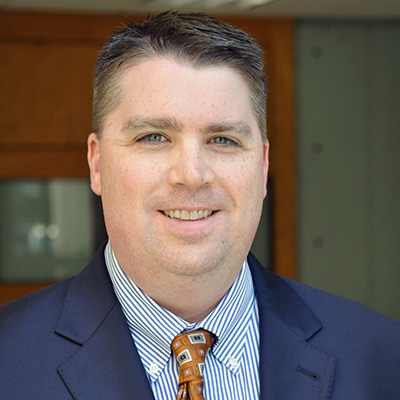
The College of Engineering and Computer Science (ECS) is proud to welcome Professor Alex K. Jones as the Klaus Schroder Endowed Professor for Engineering and the Chair of the Electrical Engineering and Computer Science Department (EECS). He joins Syracuse from the University of Pittsburgh where he had a 21-year career in the Department of Electrical and Computer Engineering (ECE) with courtesy appointments in Computer Science (CS) and Physics and Astronomy.
“I’m thrilled to join Syracuse University at this important time,” said Jones. “The designation of Syracuse University as a core partner in a Regional Tech Hub for computer chips along with the establishment of the new Micron fabrication facility is a tremendous opportunity to become a national leader in the semiconductor space with direct access to opportunities through the CHIPS and Science Act. I am also excited about the outstanding potential within the EECS Department in topics like artificial intelligence, sustainable energy, quantum science and information, and many others thanks to the talented faculty, students, and staff. In partnership with ECS and Syracuse University, broadly, I think you will see great things from EECS in the coming years that will benefit our students, our city, our state and beyond.”
Jones’ research interests are broadly in the areas of computer architecture and compilers. He is best known for research and leadership advancing the field of sustainable computing. His contributions are related to applying full lifecycle thinking to the study of environmental impacts and optimizations for computing systems including projections of environmental impacts, such as with servers in data centers.
Jones demonstrated that the critical environmental impacts from manufacturing these servers can meet or exceed those from the powering their operation in data centers. This trend has started to be noted by industry over the last half decade. More importantly, in handheld systems like mobile phones, 80% or more of the greenhouse gas emissions comes from manufacturing.
Among his research contributions in this area, Jones’ work has demonstrated that leveraging existing silicon in novel ways, such as processing-in-memory, creates an opportunity to holistically reduce greenhouse gas emissions. He has created a tool suite called GreenChip to help encourage the use of environmental-related metrics in the development of next generation computing systems. Jones has received a Carnegie Science Award, a Mascaro Center for Sustainable Innovation Faculty Fellowship, and was elevated to Fellow of the IEEE for his contributions to sustainable computing.
Jones has a significant background in academic leadership. He served as Pitt’s Director of Computer Engineering from 2011—2017, a joint program comprised of faculty from the CS and ECE departments. He led the program to unprecedented growth and an increase in visibility and rankings nationally. Jones’ philosophy combined better engagement between students and faculty in the program and a curriculum that included the newest developments in the field and aspects of the excellent research undertaken by computer engineering program faculty. During his tenure as director, Computer Engineering at Pitt became a top 50 program nationally, where it remains today.
Following his tenure with Computer Engineering, Jones joined the NSF Space, High Performance, and Resilient Computing (SHREC) Center and served as Associate Director from 2018—2020. He led a project team in memory reliability for high performance and space applications. He demonstrated that off-the-shelf dynamic random access memory (DRAM) used in commodity computers had specific radiation properties such that 95—99% of the faults were from predictable locations. He developed a technique that combined a fault repository and low-level error correction that could protect standard DRAM from radiation faults in space, avoiding the need to use radiation hardened devices that are expensive and trail the state of the art by several generations.
In August of 2020, Jones joined the National Science Foundation (NSF) as a program manager in the Computer and Information Science and Engineering (CISE) directorate in the Computer and Network Systems (CNS) Division as part of the Computer Systems Research (CSR) cluster. A significant accomplishment was his creation of the Design for Environmental Sustainability of Computing (DESC) program. He was also the managing program director of the ATHENA AI Institute led by Duke University. In his third year at the NSF, he was elevated to serve as cluster lead for CSR. In his fourth year, he was appointed as the Deputy Division Director for the Electrical, Communications, and Cyber Systems (ECCS) Division, which is a member of the senior leadership team of the Engineering (ENG) Directorate.
While at NSF, Jones established a new personal research direction in quantum computing. Attracting nearly three million dollars in funding from Foundation and Department of Defense grants with his physics colleague Michael Hatridge (Pitt/Yale) and the latter with Hatridge and Robert Schoelkopf (Yale) to develop modular computer architectures, Jones’ research demonstrates better target quantum gates and interconnection topologies that can be realized with high fidelity superconducting systems. These approaches improve the size of quantum applications that can be solved in noisy quantum machines.
Jones received his Ph.D. from Northwestern University, where he was a Walter P. Murphy Fellow. His first major paper at Northwestern on translating MATLAB applications into hardware descriptions went on to be a seminal work (top 25 paper of all time) in the IEEE Field Programmable and Custom Computing Machines (FCCM) Conference. His Ph.D. work in compilation/high-level synthesis of C/C++ codes into hardware descriptions crystallized his interest in compilation and configurable computing. This work informed some of his early work at Pitt in design automation of coarse-grain reconfigurable computing fabrics and radio frequency identification (RFID) devices. Compilation remains a core focus of Jones’ research as applied to configurable architectures and most recently in terms of programming quantum systems (transpilation).
In his spare time, Jones is a freelance clarinetist. In Pittsburgh he was the principal clarinetist of the Pittsburgh Philharmonic, where he has been a featured soloist, served briefly as its artistic director, and served as guest conductor. He also enjoys downhill skiing.
